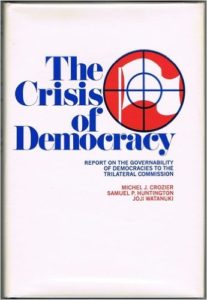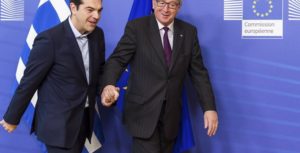As the EU’s internal crisis increases with many citizens rebelling against what has become a neo-liberal project, European politicians are racing to strip national governments of all power to prevent any further democratic interventions. The centre-left still believes the EU is an institution for the good of Europe. They fail to ask the most important question: Whose Europe are we talking about? By Bill Mitchell and Thomas Fazi. This article was first published by our partner Brave New Europe.
History of neoliberal EU
Pinpointing the moment at which the process of European integration took a turn for the worse is not an easy task. That is because the more nefarious (from a progressive perspective) aspects of that process are the result of seemingly non-nefarious decisions taken decades earlier. For the sake of simplicity, we can trace the beginning of Europe’s turn to neoliberalism to the mid-1970s, when the so-called ‘Keynesian’ regime, which had taken hold in the West after the war, was experiencing a full-blown crisis.
Militant wage pressure, rising costs, and increased international competition had caused a squeeze on profits, provoking the ire of capitalists. But, on a more fundamental level, the full employment regime ‘threatened to provide the foundations for transcending capitalism’ itself: an increasingly militant working class had begun to link up with the new counterculture movements of the late 1960s, demanding a radical democratisation of society and the economy.
As the Polish economist Michał Kalecki had anticipated thirty years earlier, full employment hadn’t become simply an economic threat to the ruling classes but a political one as well. This preoccupied elites throughout the 1970s and 1980s, as confirmed by various documents published at the time. The Trilateral Commission’s oft-cited Crisis of Democracy report of 1975 argued, from the establishment’s perspective, that a multi-level response was required. One aimed not only at reducing the bargaining power of labour, but also at promoting ‘a greater degree of moderation in democracy’ and a greater disengagement (or ‘non-involvement’) of civil society from the operations of the political system, to be achieved by spreading ‘apathy’.

This second objective – which the Trilateral Commission judged to be ‘a central precondition’ for attaining the first objective: the transition to a new economic order (that is, neo-liberalism) – was achieved primarily through gradually depoliticising economic policy. That meant hollowing out national sovereignty and removing macroeconomic policy from democratic (parliamentary) control – for example by making central banks formally independent of governments – thereby effectively insulating the neoliberal transition from popular contestation. By ‘tying their own hands’, governments were able to reduce the political costs of the neoliberal transition – which clearly involved unpopular policies – by blaming international agreements and treaties, as well as multilateral institutions. These policies were then presented as the inevitable outcome of the new, harsh realities of globalisation.
In Western Europe this struggle to demobilise popular movements was brought to its most extreme conclusion. Following the collapse of the Bretton Woods system of fixed exchange rates, in 1971, most European countries continued to experiment with various forms of currency arrangements. This eventually led to the creation, in 1979, of the European Monetary System (EMS), which essentially anchored all participating currencies to the German mark and, consequently, to the ‘anti-Keynesian’ and anti-inflationary stance of the Bundesbank. This strategy succeeded in fostering greater exchange rate cohesion, but the adjustment fell entirely on the shoulders of the high-inflation, weaker-currency countries. Their currencies appreciated in real terms and transmitted a disinflationary impulse throughout the EMS. This ‘competitive disinflation’ led to the low growth and high unemployment that characterised the European economy in the 1980s, generating structural current account deficits in countries like Italy and France.
The decision of the weaker-currency nations to join the EMS led to a loss of competitiveness and export shares on their part, while hugely benefiting the stronger-currency nations (particularly Germany). From the point of view of the former, this might appear largely self-defeating. However, such a decision cannot be understood solely in terms of nationally framed interests, but should be viewed as the way in which one part of the ‘national community’ was able to constrain another, as James Heartfield noted. This was a reaction to the distributional struggle of the 1970s, when European capital called for the state to discipline the working classes and their organisations, in order – first and foremost – to restore the profitability of capital through wage compression. In this sense, the logic of ‘competitive disinflation’ hardwired into the EMS allowed national politicians, now ‘deprived’ of the tool of competitive devaluation, to present wage compression and fiscal austerity as the only means through which to restore a country’s competitiveness.
The prism of ‘depoliticisation’, a willing and conscious limitation of state sovereign rights by national elites, helps us understand all the subsequent phases of the European integration process.
A major breakthrough came in 1986 with the Single European Act, which abolished all capital controls throughout the EEC. These controls had been the major reason for any sense of currency stability in Europe until that moment – but this was overlooked by the Delors Report of 1989, which was the logical extension of the single market legislation and which acted as a blueprint for the Maastricht Treaty of 1992. That treaty (formally, the Treaty on the European Union, or TEU) established an official timeline for establishing a European monetary union. Most participating states agreed to adopt the euro as their official currency, and to transfer control over monetary policy from their respective central banks to the ECB by 1999. Germany also insisted that ECB’s sole objective should be to keep inflation down: its main, if not its only, criterion for acting would be to ensure price stability. Furthermore, Articles 123 to 135 of the updated form of the Maastricht Treaty, the Treaty on the Functioning of the European Union (TFEU), clearly prohibited the ECB from financing public deficits.
With hindsight, the aim seems clear: to extend a free-market-like logic to the public finances of states, thereby activating a disciplinary effect. We saw the ugly effects of this in Europe in the aftermath of the 2007–9 financial crisis. Jean-Claude Trichet, former president of the ECB, made no secret of the fact that the central bank’s refusal to support public bond markets in the first phase of the financial crisis was aimed at forcing eurozone governments to consolidate their budgets.
The Maastricht Treaty also set out strict deficit- and debt-to-GDP limits for member states – which were subsequently tightened. This essentially deprived countries of their fiscal autonomy without transferring this spending power to a higher authority. As Heartfield wrote, monetary union can thus essentially be considered ‘a process of depoliticizing a central plank of economic and fiscal administration, the currency’. In this sense, the establishment of the euro can be considered the end-point of the European elites’ decades-long war on sovereignty and democracy.
As the late, great British economist Wynne Godley presciently wrote in 1992, ‘the power to issue its own money, to make drafts on its own central bank, is the main thing which defines national independence’. Thus, by adopting the euro, member states effectively acquired the status of local authorities or colonies.
The central issue of European Treaties
The scope of the European treaties, however, extends well beyond fiscal and monetary policy. The texts effectively set down the primary legal structure of the European Union’s economic policy. This has since essentially remained unchanged. The EU’s guiding principles are clearly espoused in the prefix to the chapter on economic policy, where it says that the EU and its member states must conduct economic policy ‘in accordance with the principle of an open market economy with free competition’ and to comply with the guiding principles of ‘stable prices, sound public finances and monetary conditions and a sustainable balance of payments’.
Other relevant articles of the TFEU include:
- Article 81, which prohibits any government intervention in the economy ‘which may affect trade between Member States’;
- Article 121, which gives the European Council and European Commission – both unelected bodies – the right to ‘formulate … the broad guidelines of the economic policies of the Member States and of the Union’;
- Article 126, which regulates the disciplinary measures to be adopted in case of excessive deficit;
- Article 151, which states that the EU’s labour and social policy shall take account of the need to ‘maintain the competitiveness of the Union economy’; and
- Article 107, which prohibits state aid to strategic national industries.
The treaties essentially embedded neoliberalism into the very fabric of the European Union, effectively outlawing the ‘Keynesian’ polices that had been commonplace in the previous decades. They prevent currency devaluation and direct central bank purchases of government debt (for those countries that adopted the euro.) They prevent demand-management policies, or the strategic use of public procurement, and they place tight curbs on generous welfare provisions and the creation of employment via public spending. They have laid the basis for a wholesale re-engineering of European economies and societies.
The legal implications of these treaties – which are often overshadowed by social and economic considerations – cannot be overestimated. That is because, even though France and the Netherlands famously voted against a joint European constitution in 2005, ‘ultimately the treaties do establish a constitutional order for the EU’. Yet it is a very peculiar constitutional order, due to its supranational (and therefore intrinsically non-democratic) nature. Unlike national constitutions, it cannot be democratically amended by citizens: it can only be amended unanimously in the context of a new international agreement – which, in practical terms, means that it is not amendable. The only thing individual states can do is repudiate the whole structure.
As the president of the European Commission himself, Jean-Claude Juncker, said at the beginning of SYRIZA’s mandate, ‘there can be no democratic choice against the European treaties’.

Moreover, unlike other constitutions and legal frameworks, which generally define the relation between a state’s various institutions and the basic rights of citizens, this effective European constitution ‘formulates a specific economic philosophy (or ideology) on which it then bases – or rather “constitutionalises” – detailed regulations that frame its economic policy’.
It does this also by anchoring norms and regulations within national constitutions, thus progressively hollowing them out from the inside. This gives immense powers to the European Court of Justice, which has the final word on legal disputes between national governments and EU institutions. It is no surprise that Alec Stone Sweet, an international law expert, termed it a ‘juridical coup d’état’.
In recent years the European Union’s authoritarian constitutionalism has evolved into an even more anti-democratic form that is breaking away from elements of formal democracy, leading some observers to suggest that the EU ‘may easily become the post democratic prototype and even a pre-dictatorial governance structure against national sovereignty and democracies’. We saw this in Greece in 2015, when the ECB actually cut off its emergency liquidity to Greek banks in order to bring the SYRIZA government to heel and force it to accept the third bailout memorandum.
To conclude, any belief that the EU can be ‘democratised’ and reformed in a progressive direction is a pious illusion. Not only would this require an impossible alignment of left movements/governments to emerge simultaneously at the international level. On a more fundamental level, a system that was created with the specific aim of constraining democracy cannot be democratised. It can only be rejected.
Thomas Fazi is a writer, journalist, translator and researcher.
Bill Mitchell is Professor of Economics and Director of the Centre of Full Employment and Equity at the University of Newcastle, Australia
Featured Image ©William Murphy/Streets Of Dublin.





Excellent and highly relevant article.
The EU is doomed, probably by attrition.
Brexit is just the first cab.
We might have to wait and see if they can send in an army to stop an exit.
The financial penalties can be ignored for the most part. And the nation can nationalise property already ceded under the onerous conditions applied to date.
If the EU wants to survive it has to reverse all neo-liberal directions. But unlikely, as this article says
[…] Link: http://new-pretender.com/2018/03/08/the-eu-cannot-be-democratised-heres-why/ […]
[…] The EU cannot be democratised – here’s why (The New Pretender, March 8, […]
[…] The EU cannot be democratised – here’s why (The New Pretender, March 8, […]